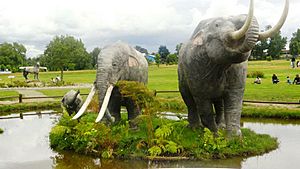Pilauco Bajo facts for kids

Gomphothere models in Parque Pleistocénico de Osorno, a park inspired by the findings of Pilauco Bajo.
|
|
| Lua error in Module:Location_map at line 420: attempt to index field 'wikibase' (a nil value). | |
| Location | Southern Chile |
|---|---|
| Type | open-air |
| History | |
| Associated with | [First American Settlers] |
| Events | Younger Dryas impact (claimed) |
| Site notes | |
| Excavation dates | 2007–present |
| Archaeologists | Mario Pino Quivira (leader) and others |
| Ownership | Bienes Nacionales de Chile |
| Management | Austral University of Chile and Ilustre Municipalidad de Osorno |
| Public access | Partial |
Pilauco is a really cool place in the city of Osorno in Southern Chile. It's a special site for both paleontologists (scientists who study ancient life) and archaeologists (scientists who study human history).
At Pilauco, researchers have found ancient tools made by humans. They've also found bones of huge, extinct animals called megafauna. These include amazing creatures like gomphotheres, which were ancient relatives of elephants. All the discoveries of megafauna and human activity at Pilauco come from the late Pleistocene epoch. This was a long time ago, often called the Ice Age. Scientists have used radiocarbon dating to figure out that humans were active here between 16,400 and 12,800 years ago.
Some scientists believe Pilauco might even hold clues about a big event called the Younger Dryas impact hypothesis. This idea suggests a space object might have hit Earth or exploded in the air a long time ago. At Pilauco, evidence for this includes layers of soil with lots of charcoal and special plant pollen. These suggest big changes happened in the environment. Scientists also found tiny, rare metal spheres and high levels of certain metals like platinum, gold, and palladium. These findings are thought to be linked to an ancient airburst or impact event.
Most of the stone tools found at Pilauco are made from volcanic rocks. These include types like dacite, rhyodacite, and rhyolite. These rocks came from the Puyehue-Cordón Caulle Volcanic Complex, which is a group of volcanoes in the Andes mountains to the east. It's interesting because these rocks didn't get to Pilauco by rivers. This means ancient humans brought them to the site!
Discoveries at Pilauco
Scientists have found many amazing things at Pilauco. These discoveries help us understand what life was like thousands of years ago. They also show us how ancient humans lived and interacted with their environment.
What Paleontologists Found
In 2007 and 2008, a big study took place at Pilauco. Paleontologists carefully dug up many items. They found 648 complete and broken bones from various animals. They also discovered 37 teeth, which are very important for identifying ancient creatures.
Other interesting finds include 11 coprolites, which are fossilized animal droppings. These can tell scientists a lot about what ancient animals ate. Researchers also found 348 pieces of wood and 126 seeds. These give clues about the plants that grew in the area long ago. They even found 28 fragments of skin and hair! In addition, 71 samples of sediment (soil and dirt) were collected for detailed analysis.
See also
 In Spanish: Pilauco Bajo para niños
In Spanish: Pilauco Bajo para niños
 | James Van Der Zee |
 | Alma Thomas |
 | Ellis Wilson |
 | Margaret Taylor-Burroughs |

